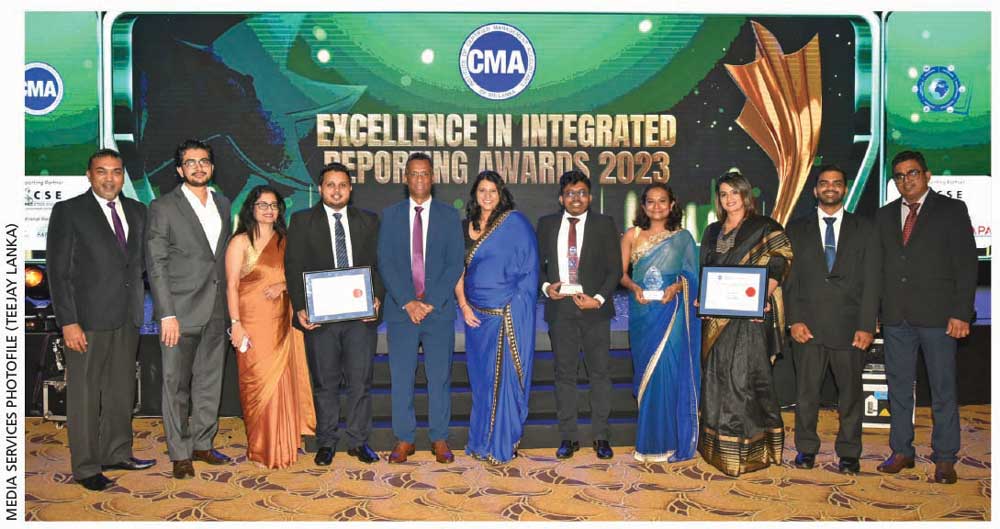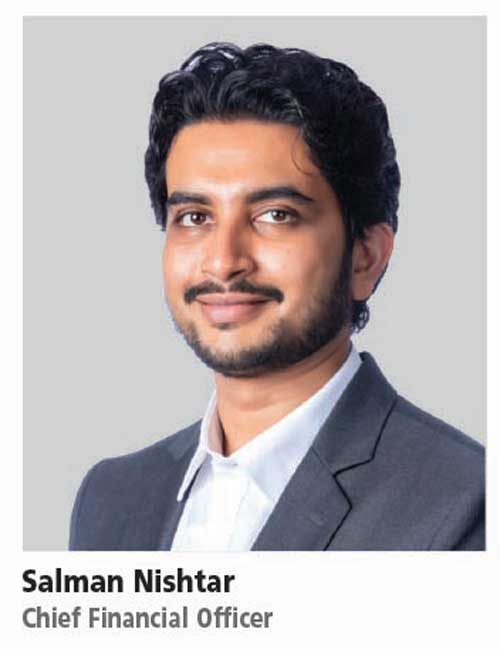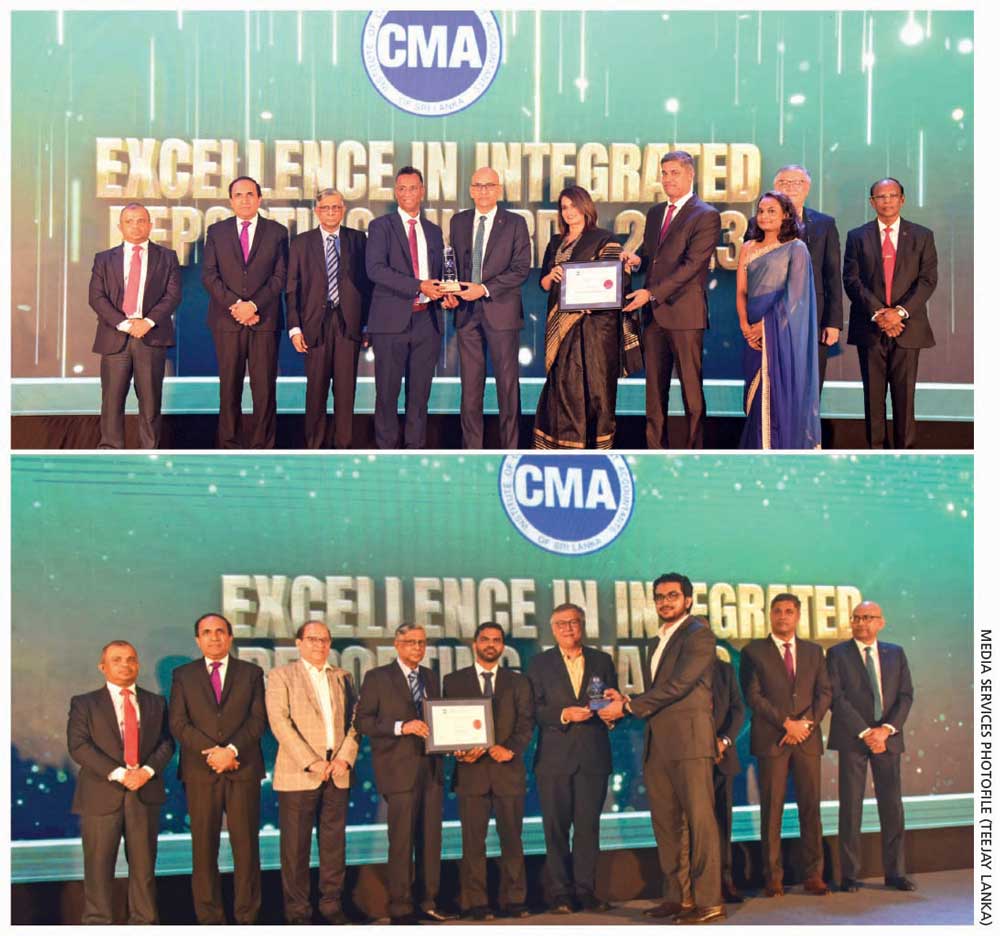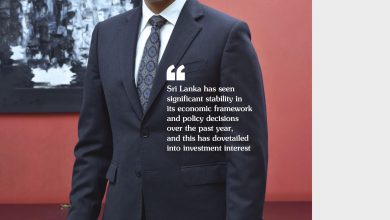 Q: Could you share a brief overview of Teejay Lanka and the award that it won recently?
Q: Could you share a brief overview of Teejay Lanka and the award that it won recently?
A: Teejay Lanka, in operation since 2001, is positioned as the first multinational textile mill to have subsidiaries in both Sri Lanka and India. The primary focus is the production of weft print fabric for renowned international clientele.
As a key player in the apparel industry, sustainability is at the heart of our operations. We’re an integral part of the supply chain responsible for manufacturing fabric and garments that find their way to international brands across Europe and the US. In terms of capacity, we produce 100 tonnes daily.
Over the years, we’ve evolved from a single entity into a thriving network, solidifying our presence in the region.
Notably, our commitment to excellence was recognised with the recent honour of receiving the award for ‘Best Annual Report in the Apparel Sector’ at the CMA Excellence in Integrated Reporting Awards 2023. This award was bestowed on us from a pool of esteemed organisations in the apparel industry.
It stands as a testimony to the dedication and hard work of our team and renowned consultants for ESG (environmental, social and governance).

Q: What were the key highlights in the annual report titled Interknitted – and how do they reflect your commitment to sustainability and responsible corporate citizenship?
A: We chose the name Interknitted due to the intricacies involved in our fabric manufacturing and knitting processes, both of which include numerous variables. This aligned with our overarching theme of transformation, diversification, innovation and best practices – all seamlessly interwoven within a single design.
The aim was to illustrate this interconnection in our annual report to provide a comprehensive understanding to customers, investors and all our stakeholders. Our objective is to shed light on the intricate process of converting yarn into fabric. While it may appear straightforward, it entails variables to achieve an internationally acceptable outcome.
As part of our transformation journey, we structured all environment, social and governance work in line with Global Reporting Initiative (GRI) standards to highlight a better understanding of the intricacies in our operations to all stakeholders.
Our commitment to sustainability is ingrained in our DNA and woven into our management processes, and demonstrated through this structured approach.
Q: And what is Teejay’s approach to integrating corporate strategies while balancing diverse stakeholders?
A: Our primary stakeholders – customers and investors – have distinct requirements.
Customers demand sustainable products as they have brand goals and targets, and we must address specific requirements, which include water and energy consumption, and the sustainability of suppliers.
We have a well-structured ESG stewardship approach where we’ve identified key stakeholder interests under a material assessment methodology and based on the understanding of diverse stakeholder interests, we’ve honed our strategies accordingly.
In the strategy on environment stewardship, our programme named Abhivara addresses all the material environmental interests raised through the assessment.
Similarly, social stewardship is addressed through Thirasara Mehewara, where we drive a sanitation and hygiene awareness programme, and infrastructure development for schoolchildren.
Our sustainability goals are closely aligned with the UN’s Sustainable Development Goals (SDGs) for 2030, and this involves a systematic and globally recognised process of evaluating our current standing, identifying necessary actions and determining the path to achieving these targets.
Q: How do you view the role of ESG and risk management in long-term sustainability initiatives and overall business practices?
A: They’re significant as they are driven by the demands of our key stakeholders, and deeply ingrained within the organisational culture and integrated into the management process.
Our ESG strategy is a journey that enables us to identify long and short-term requirements where our approach to risk management is systematic, commencing with the identification of environmental, social and governance risks.

Q: In your view, how important is the establishment of an ESG framework to the organisation?
A: The ESG framework has been operational for the past two years and we’re actively working across the group in this regard. A dedicated committee oversees it and deliberations are examined at the CEO level.
We’ve established three pillars and engaged three distinct entities that collaborate closely. These efforts are consolidated under the core ESG team, which subsequently reports to the CEO and board. This approach has enabled us to address all environmental, social and governance requirements across the group including Teejay Lanka, Teejay India and Teejay Prints.
We have created a unified platform to manage all ESG requirements. As a result, we’ve initiated a range of activities focussing on economic performance, stewardship, labour practices and social responsibilities, each tailored to address specific risks, materiality topics and the targets we aim to achieve in each area.
Q: What future initiatives does Teejay have to further enhance sustainability driven innovation and responsible corporate citizenship?
A: The future entails being compliant with the 2030 UN SDGs and achieving targets for our footprint with Abhivara.
We’ve initiated several projects to ensure net zero emissions by 2050. Other efforts include increasing renewable energy and reducing energy intensity, ensuring 100 percent waste value enhancement by reusing, recycling or recovering.
We also collaborate with institutes, organisations and foundations to increase plant coverage by planting one million saplings to preserve the natural ecosystem.
– Compiled by Tamara Rebeira
COMPANY DETAILS
Telephone: 036 4279500 | Email: info@teejay.com | Website: www.teejay.com



